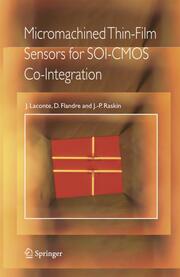Detailansicht
Micromachined Thin-Film Sensors for SOI-CMOS Co-Integration
ISBN/EAN: 9780387288420
Umbreit-Nr.: 1447819
Sprache:
Englisch
Umfang: xiv, 292 S.
Format in cm:
Einband:
gebundenes Buch
Erschienen am 11.04.2006
Auflage: 1/2006
- Zusatztext
- InhaltsangabeI. Introduction: Context and motivations. 0.1. Why Silicon-on-Insulator technology ? 0.2. Why a thin-film membrane ? 0.3. Why co-integration and CMOS compatibility ? 0.4. Contents of the work II. Techniques and materials. 1. Silicon bulk micromachining with TMAH. 1.1. Introduction. 1.2. Generalities about silicon micromachining. 1.3. TMAH silicon etching. 1.4. Selectivity versus dielectrics. 1.5. Selectivity versus aluminum. 1.6. Selectivity versus other metals. 1.7. Etch-Stop. 1.8. Undercutting. 1.9. Summary. 2. Thin dielectric films stress extraction. 2.1. Introduction - Definitions, 2.2. Stress measurements by substrate curvature method. 2.3. Strain measurements using micromachined structures. 2.4. Final conclusions. III. Microsensors. 1. Low power microhotplate as basic cell. 1.1. Introduction. 1.2. Motivations. 1.3. Materials selection. 1.4. Thermal design. 1.5. Device fabrication. 1.6. Microheater characterization and results. 1.7. Conclusions. 2. Microheater based flow sensor. 2.1. Introduction. 2.2. Design and fabrication. 2.3. Measurements results. 2.4. Discussions and comparison with the state-of-the-art. 2.5. Conclusions. 3. Gas Sensors on microhotplate. 3.1. Introduction. 3.2. Interdigitated electrodes: from design to deposition. 3.3. Sensitive layer deposition. 3.4. Summary of the fabrication steps. 3.5. Measurements results without gas. 3.6. Measurement results under gas and discussions. 3.7. Conclusions. 4. SOI-CMOS compatibility validation. 4.1. Introduction. 4.2. Basics of SOI technology. 4.3. Post-processing steps. 4.4. Measurements. 4.5. Transistors on membrane as final demonstrator. 4.6. Conclusions. IV. Conclusions and outlook Appendixes. A. (100) Silicon crystallography. B. About Interferometry. C. About Reflectometry. Bibliography. Publications originated fromthis work. Index.
- Kurztext
- Co-integration of MEMS and MOS in SOI technology is promising and well demonstrated hereThe impact of Micromachining on SOI devices is deeply analyzed for the first timeInclude extensive TMAH etching, residual stress, microheaters, gas-flow sensors reviewResidual stresses in thin films need to be more and more monitored in MEMS designsTMAH micromachining is an attractive alternative to KOHIncludes supplementary material: sn.pub/extras
- Autorenportrait
- InhaltsangabeI. Introduction: Context and motivations. 0.1. Why Silicon-on-Insulator technology ? 0.2. Why a thin-film membrane ? 0.3. Why co-integration and CMOS compatibility ? 0.4. Contents of the work II. Techniques and materials. 1. Silicon bulk micromachining with TMAH. 1.1. Introduction. 1.2. Generalities about silicon micromachining. 1.3. TMAH silicon etching. 1.4. Selectivity versus dielectrics. 1.5. Selectivity versus aluminum. 1.6. Selectivity versus other metals. 1.7. Etch-Stop. 1.8. Undercutting. 1.9. Summary. 2. Thin dielectric films stress extraction. 2.1. Introduction - Definitions, 2.2. Stress measurements by substrate curvature method. 2.3. Strain measurements using micromachined structures. 2.4. Final conclusions. III. Microsensors. 1. Low power microhotplate as basic cell. 1.1. Introduction. 1.2. Motivations. 1.3. Materials selection. 1.4. Thermal design. 1.5. Device fabrication. 1.6. Microheater characterization and results. 1.7. Conclusions. 2. Microheater based flow sensor. 2.1. Introduction. 2.2. Design and fabrication. 2.3. Measurements results. 2.4. Discussions and comparison with the state-of-the-art. 2.5. Conclusions. 3. Gas Sensors on microhotplate. 3.1. Introduction. 3.2. Interdigitated electrodes: from design to deposition. 3.3. Sensitive layer deposition. 3.4. Summary of the fabrication steps. 3.5. Measurements results without gas. 3.6. Measurement results under gas and discussions. 3.7. Conclusions. 4. SOI-CMOS compatibility validation. 4.1. Introduction. 4.2. Basics of SOI technology. 4.3. Post-processing steps. 4.4. Measurements. 4.5. Transistors on membrane as final demonstrator. 4.6. Conclusions. IV. Conclusions and outlook Appendixes. A. (100) Silicon crystallography. B. About Interferometry. C. About Reflectometry. Bibliography. Publications originated fromthis work. Index.
